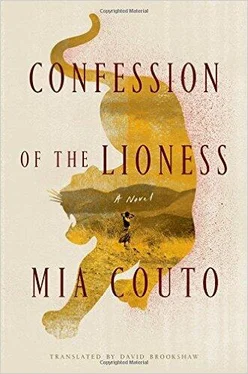I need to know: Which bits of her body couldn’t we bury?
I’ve already told you to be quiet, woman.
His voice trembled, leaflike: My father was struggling with inner demons. The blood-soaked sack containing his daughter’s remains still dripped in his memory. And once again he was assailed by a recollection that could never be laid to rest: the sudden confusion of voices and panic that had woken him in the early hours of the previous day. Genito Mpepe had crossed the yard expecting tragedy. Moments before, he had heard the lions prowling around the house. Suddenly there were roars, cries, wails dispersing in the air, the world sank out of sight in shattered pieces: Nothing remained within him. To forget such an event, it would be necessary never to have lived.
The heart? Hanifa persisted.
Again? Didn’t I tell you to keep quiet?
Did we bury her heart? You know very well what they do with the heart …
My father took a deep breath, and contemplated the old clothes hanging from the rafters. He didn’t feel any different from those garments, drooping shapelessly and without soul in the emptiness. His voice returned to him, and he spoke softly once again:
Think of it this way, woman: A child doesn’t have a grave.
I don’t want to listen to this, I’m going out.
Going out?
I’m going to get what’s left of our daughter out there in the bush.
You’re not going. You’re not leaving the house.
No one’s going to stop me.
She would leave home, she would go beyond the paths created by people, her feet would bleed, her eyes would burn from their encounter with the sun, but she would go and get what remained of Silência, forever her little girl-child. Blocking her way, her husband threatened:
I’m going to tie you with a rope, like an animal.
Tie me up, then. I’ve been no more than an animal for a long time. You’ve been sleeping with an animal in your bed for a long time now …
That put an end to the discussion. Hanifa silently curled up, her arms snuggled between her legs, as if she wanted to give in to sleep.
Are you going to sleep on the floor? Genito asked.
She lay on the ground, her head resting on the stony floor. She wanted to listen to the world’s insides. The women of Kulumani know secrets. They know, for example, that within their mother’s womb, babies, at a given moment, change position. Throughout the world, they turn on themselves, obeying a single voice from deep within the earth. The same happens with the dead: On the same night — and it can only happen on that particular night — they are all ordered to turn over in the earth’s belly. This is when lights glow over their graves, a swirling of silvery dust. Whoever sleeps with his (or her) ear to the ground hears this gyration of the dead. It was for this reason, unknown to Genito, that Hanifa refused a bed and a pillow. Flat out on the floor, she was listening to the earth. It wouldn’t be long before her daughter made herself felt. Who knows, maybe the twins, Uminha and Igualita, the ones who had died before, would deliver her messages from the other side of the world.
Her husband didn’t go to bed: He knew that he was in for a long night. The memory of his daughter’s mangled body would keep sleep at bay. The lion’s roar would echo within him, lacerating his sleepless hours. He remained for a while on the veranda, peering into the darkness. Maybe the stillness would bring him respite. But silence is an egg in reverse: The shell is someone else’s, but it’s we who get broken.
One doubt consumed him: How had the tragedy occurred? Had his daughter left the house in the middle of the night? And if that had been the case, was it her intention to end her life? Or, conversely, had the lion broken into the house, more burglar than beast?
Suddenly the whole world was shattered: The peace of the bush was interrupted by the sound of furtive steps. Genito’s heart thumped hard against his chest. What was happening was what always happened: The lions were coming back to eat what they’d left behind the previous day.
Then, unexpectedly, like a man possessed, he started yelling, while running this way and that:
I know you’re there, creatures of the devil! Show yourselves, I want to see you come out of the bush, you’re vantumi va vanu!
I watched him in this frenzied state from the window, as he challenged the lion-people, the vantumi va vanu . All of a sudden he flopped to the ground as if his knees had been smashed. He raised his head slowly and saw that he was in the embrace of a bat’s dark wings. He couldn’t hear a sound, not even the rustling of a wing or a leaf above his head. Genito Mpepe was a tracker — he knew all the invisible signs of the savanna. He had often told me: Only humans recognize silence. For all the other creatures, the world is never silent and even the grass growing and the petals opening make a huge noise. In the bush, the animals live by listening. That’s what my father envied at that moment: He wished he were an animal. And far from human beings, to be able to return to his lair and fall asleep without pity or guilt.
I know you’re there!
This time his words were no longer laden with rage. Hoarseness caused his voice to weaken. Repeating his curses, he returned to the house to seek refuge in his bedroom. His wife was still lying curled up on the floor, just as he had left her. As he was covering her with a blanket, Hanifa Assulua woke with a start, and, clinging furiously to her husband’s body, she exclaimed:
Let’s make love!
Now?
Yes. Now!
You’re out of your mind, Hanifa. You don’t know what you’re saying.
Are you refusing me, husband? Don’t you want a quick one?
You know that we can’t. We’re in mourning — the whole village will be sullied.
That’s what I want: the village, the whole world, to be sullied.
Hanifa, listen to me: Time will pass, folk will forget. People even forget they’re alive.
I haven’t been alive for a long time. Now I’ve stopped being a person.
My father looked at her as if she were a stranger. His wife had never spoken like that before. In fact, she almost never spoke. She had always been contained, kept in the shadows. After the twins had died, she never again uttered a word. So much so that her husband would occasionally ask:
Are you alive, Hanifa Assulua?
But it wasn’t that she spoke so little. For her, life had become a foreign language. Once again, his wife was preparing herself for this absence, Genito thought, without noticing that Hanifa, in the darkness, was taking off her clothes. Once naked, she hugged him from behind and Genito Mpepe succumbed to her serpent’s embrace. He seemed to have surrendered, when he suddenly shook his wife and beat a hurried retreat to the yard. Then he disappeared into the darkness.
In the hidden recess of her room, my mother gave herself over to brazen caresses, as if her man were really with her. And so, in this way, she was in command, galloping on her own croup, dancing over her own fire. She sweated and groaned:
Don’t stop, Genito! Don’t stop!
That’s when she became aware of the smell of sweat. A sour, intense smell like that of wild animals. Afterward, she heard the grunt. Then it occurred to my mother that it wasn’t her man who was on top of her, but a creature from the bush, thirsty for her blood. During the act of love, Genito Mpepe had turned into a wild beast that was devouring her. Weakened by his fervor, she was helpless, at the mercy of his feline appetite.
Читать дальше












